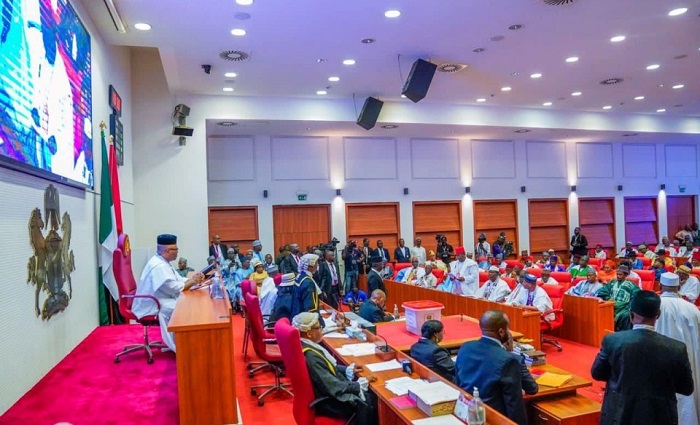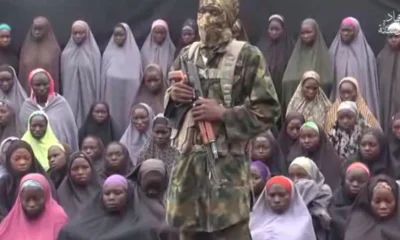News
BREAKING: Senate Declares Kidnapping as Terrorism, Prescribes Death Penalty for Kidnappers
The Nigerian Senate has formally classified kidnapping as an act of terrorism and recommended the death penalty for kidnappers.

- The Nigerian Senate has formally classified kidnapping as an act of terrorism and recommended the death penalty for kidnappers following an intense debate sparked by the deadly attack on a church in Kwara State.

The Senate on Wednesday took a decisive position on the country’s deteriorating security situation, officially declaring kidnapping a form of terrorism and recommending the death penalty for convicted offenders — without fines or judicial discretion to reduce sentences.
The resolution followed an hours-long, tense debate triggered by the November 18 attack on Christ Apostolic Church, Eruku, in Ekiti Local Government Area of Kwara State, where gunmen killed two worshippers and abducted 38 others.
Although all victims were later rescued in joint operations by the army, police, DSS, and vigilantes, lawmakers argued that the incident revealed the rapid southward expansion of insurgent networks and the increasing vulnerability of rural communities.
The decisions followed a motion moved by Senator Yisa Ashiru (Kwara South) titled “Urgent Need to Address Escalating Insecurity in Kwara, Kebbi, and Niger States and Strengthen National Security Frameworks.”
The motion opened the floor to a flood of concerns over worsening attacks on schools, places of worship, highways, and entire communities.
Lawmakers noted that school abductions have forced the shutdown of all schools in local governments across Kebbi and Niger States, five LGAs in Kwara, and all 47 Federal Unity Colleges nationwide.
Senator Issa Jibrin (Kogi East) lamented the country’s critical manpower shortage in security services, warning that Nigeria’s entire military, police, and paramilitary strength “does not total one million,” compared to Egypt’s 1.5 million. He pushed for equipment upgrades, better intelligence coordination, and the creation of a national reserve force.
Other senators raised alarm that banditry was advancing toward Osun State through Ekiti-linked communities around Eruku–Isapa–Koro — areas where a retired Army General and a traditional ruler were recently killed.
Lawmakers also blamed rampant attacks on poor road infrastructure, directing the Federal Ministry of Works to immediately begin reconstruction of the Idofian–Omu-Aran–Eruku–Egbe–Kabba corridor, described as a major escape route for criminals.

Amid the rising brutality of ransom-driven gangs, senators unanimously resolved that kidnapping had evolved into full-blown terrorism and must attract the most severe punishment.
Several senators insisted that “Capital punishment must apply”, adding that no court should have the authority to reduce the sentence for convicted kidnappers.
The Senate also urged President Bola Tinubu to “further rejig the nation’s security architecture.”
The comment sparked caution from Senator Ali Ndume, who warned that such language could be misinterpreted given the recent confirmation of service chiefs. The chamber clarified that the call was meant to strengthen coordination, intelligence, technology, and rapid response — not to remove security chiefs.
In an unexpected move, the Senate dissolved its Committee on National Security and Intelligence and its Committee on Air Force with immediate effect.
All remaining security-related committees were directed to submit oversight reports and brief the chamber behind closed doors within one week.
Lawmakers further recommended strengthening registered vigilante groups with federal support and ordered a review of the firearms law to permit the controlled arming of responsible citizens.
Earlier in the rowdy session, the Senate adopted a separate motion by Senator Ashiru commending President Tinubu and security agencies for rescuing dozens abducted in Kwara and Niger States. That motion also called for a Joint Task Force along the Kwara–Kogi corridor, described as a notorious escape route for bandits.
Debate grew heated as senators discussed mass kidnappings in Niger, school abductions in Kebbi, and the Eruku church attack.
Ashiru warned that the Senate was “deeply disturbed” by the CAC church raid and cited credible reports that soldiers withdrew from the affected Kebbi school hours before bandits struck.
Deputy Senate President Barau Jibrin urged Nigeria to widen its search for solutions, saying, “We should seek assistance from overseas.”
Senate Leader Opeyemi Bamidele described the security crisis as defining.
While acknowledging rescue efforts, he questioned why security agencies had provided no breakdown of terrorists neutralised and urged internal legislative reforms, saying:
“If we are calling on the President to rejig the security architecture, we must also look into our own arrangement.”
DON’T MISS: SSS Reveals How Bandit Leader Offered Tukur Mamu ₦50m Cut From Ransom Payments
Senator Enyinnaya Abaribe criticised attempts to blame past administrations, insisting the current government must accept responsibility.
He cited the alleged withdrawal of troops before the Kebbi school attack, stating, “If I were the Commander-in-Chief, I would demand answers.”
Senate President Godswill Akpabio raised concerns about compromises in the intelligence community, recalling cases where the location of a brigadier general killed in Borno had allegedly been leaked. He also questioned how bandits succeeded in Kebbi despite earlier warnings.
Tensions peaked when Senator Seriake Dickson accused the Senate of “losing prestige and integrity,” prompting protests from APC lawmakers. Akpabio muted his microphone to restore calm.
Senator Adams Oshiomhole later defended President Tinubu and demanded a full investigation into the Kebbi troop withdrawal, declaring, “Who ordered the military to withdraw? That person should be tried for terrorism.”
The Senate adopted his recommendation and renewed the push for the death penalty for kidnappers.























